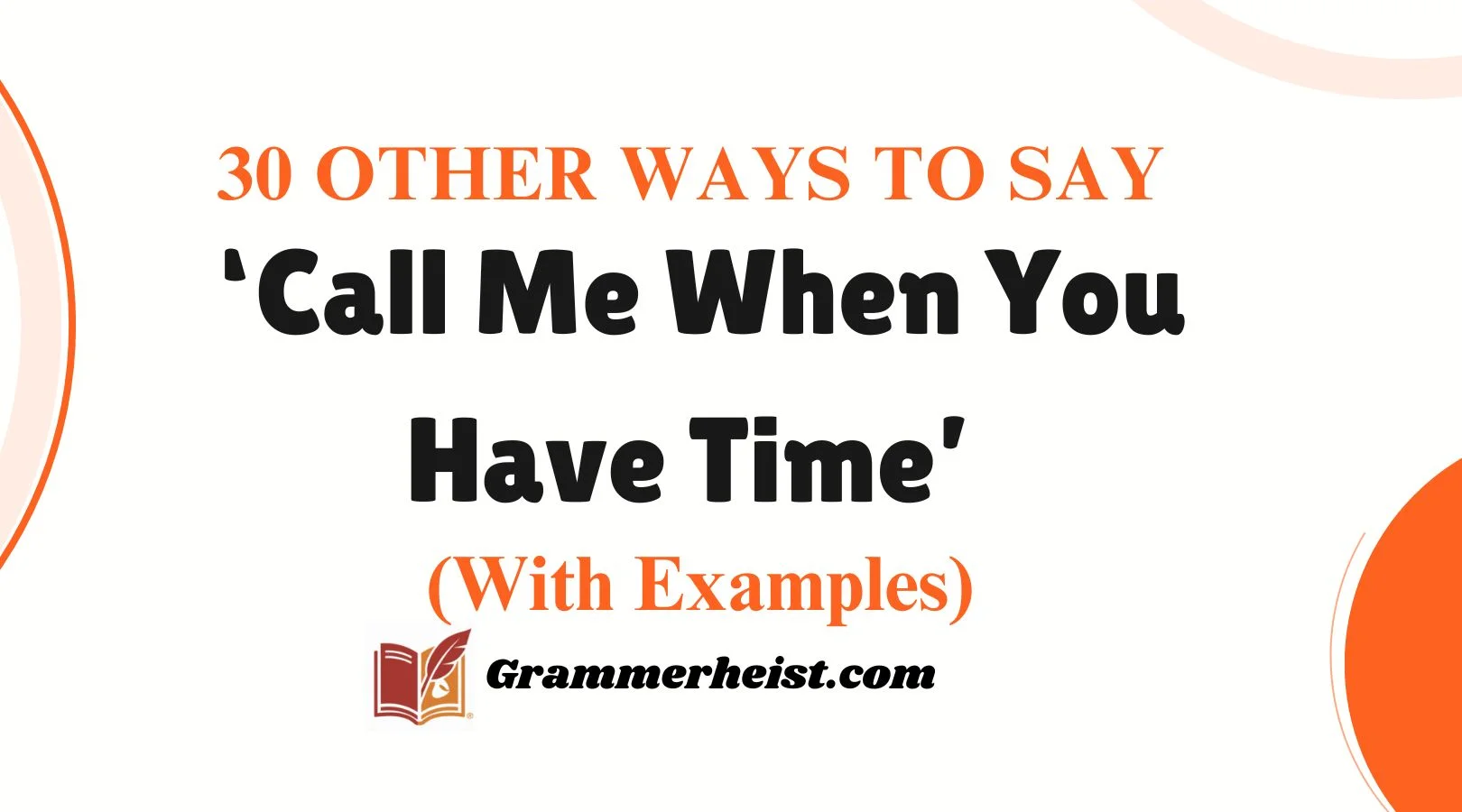Finding the right words to express yourself with warmth and care can make all the difference in communication. Whether you’re reaching out to a friend, family member, or colleague, thoughtful phrasing conveys both respect and affection. Instead of the generic phrase, ‘Call me when you have time,’ there are countless alternatives that can feel more personal and meaningful. Here are 30 other ways to express the same sentiment while showing consideration for the recipient’s time.
What Does “Call Me When You Have Time” Mean?
The phrase ‘Call me when you have time’ is a casual way of asking someone to contact you at their convenience. It implies that the caller is flexible and understands that the other person may be busy. It’s a polite request for communication without putting pressure on the recipient.
Is It Professional/Polite to Say ‘Call Me When You Have Time’?
Yes, the phrase is generally polite and professional, but in formal settings, it might be better to use a more refined expression to maintain professionalism. In personal relationships, it strikes a friendly and understanding tone. However, the way you phrase this can reflect your respect for the person’s schedule and comfort.
Advantages or Disadvantages of Saying ‘Call Me When You Have Time’
Advantages:
- Shows patience and understanding
- Provides the other person with flexibility
- Feels considerate and thoughtful
Disadvantages:
- Might sound too casual in formal settings
- Can imply that you’re not in a hurry, which might be misunderstood if urgency is implied
- Can sometimes feel a little impersonal if overused
Synonyms for ‘Call me when you have time’:
- “Give me a ring when you have a moment.”
- “Ping me when you’re free.”
- “Reach out whenever you can.”
- “Call me whenever you find the time.”
- “When it’s convenient for you, give me a call.”
- “Text or call me when you get a chance.”
- “Let me know when you can talk.”
- “Give me a shout when you’re free.”
- “Let’s connect when you’re available.”
- “Let me know when you’re not tied up.”
- “Catch me when you can.”
- “Give me a call when it suits you.”
- “Get in touch when you have the time.”
- “Whenever you’re ready, give me a call.”
- “Call me when things calm down for you.”
- “Hit me up when you get a chance to breathe.”
- “Touch base when you’re available.”
- “Get back to me when you have some breathing room.”
- “Give me a call when you’re not running around.”
- “Check in with me when you get the chance.”
- “Feel free to call when you’re available.”
- “Let me know when you have a free minute.”
- “Reach out when your schedule clears up.”
- “Call me whenever it’s good for you.”
- “Give me a call whenever you’re done with your day.”
- “Drop me a line when you get a moment.”
- “Call me when you get the time to chat.”
- “When you’re not too busy, reach out.”
- “Ring me up when you’re free to talk.”
- “Let’s touch base when you have a spare moment.”
1. “Give me a call when it works for you.”
Definition: A polite and flexible way of asking someone to call when it is convenient for them.
Meaning: A soft, flexible invitation to connect at their convenience.
Explanation: This version is polite and respectful, leaving the decision entirely up to the recipient. It’s ideal when you want to avoid pressuring them.
Scenario Example: “I’d love to catch up! Give me a call when it works for you.“
Best Use: When you want to seem casual yet considerate.
Tone: Friendly and non-intrusive.
2. “Let me know when you’re free to chat.”
Definition: A request for the other person to contact you when they have time available for a conversation.
Meaning: A request to be contacted when the person has some free time.
Explanation: This is a straightforward and considerate alternative that indicates you’re waiting for their availability.
Scenario Example: “No rush, but let me know when you’re free to chat about the project.”
Best Use: When scheduling something but being mindful of the other person’s schedule.
Tone: Casual and polite.
3. “Call me whenever you get a chance.”
Definition: A polite way to say that you’d like to talk, but only when the person is available.
Meaning: A casual way to say you’d like a call, but at their convenience.
Explanation: This shows that you’re aware of the other person’s busy schedule while still requesting communication.
Scenario Example: “I have some questions for you. Call me whenever you get a chance.“
Best Use: When you don’t need to talk urgently but still want to stay in touch.
Tone: Friendly and relaxed.
4. “Hit me up when you’re not busy.”
Definition: A casual and informal way of asking for a call when the person is free.
Meaning: A laid-back way of asking for a call when the person is available.
Explanation: This one is more informal and works well in casual conversations between friends or peers.
Scenario Example: “I found something cool we should talk about. Hit me up when you’re not busy.“
Best Use: For casual, non-urgent situations.
Tone: Informal and upbeat.
5. “Let me know when you have a moment.”
Definition: A polite way to ask someone to call when they have a free moment.
Meaning: A respectful way of asking for a call when the person has a moment of free time.
Explanation: This phrase conveys that you understand the person may be busy and that you’re patient about waiting for them to be available.
Scenario Example: “I have a quick update for you. Let me know when you have a moment.“
Best Use: When you don’t want to rush the person, but still wish to communicate.
Tone: Respectful and patient.
6. “Reach out when it’s convenient for you.”
Definition: A polite, non-demanding way to ask for a call at the person’s convenience.
Meaning: A respectful request to connect when it’s suitable for the other person.
Explanation: This phrase offers full flexibility and emphasizes that you’re not in a rush.
Scenario Example: “Let me know your thoughts. Reach out when it’s convenient for you.“
Best Use: When you want to be patient and considerate.
Tone: Polite and flexible.
7. “When you get a free moment, give me a call.”
Definition: A friendly way of saying that you’d like a call, but only when the other person has time to spare.
Meaning: A gentle way of asking someone to call when they have time.
Explanation: This is a good way to ask without imposing or expecting an immediate response.
Scenario Example: “Just wanted to touch base. When you get a free moment, give me a call.“
Best Use: For non-urgent matters or casual conversations.
Tone: Easygoing and thoughtful.
8. “Drop me a line when you have time.”
Definition: A casual way of asking someone to contact you when they’re available.
Meaning: A less formal way of requesting communication when it suits the other person.
Explanation: This version is light and friendly, often used in text or email exchanges.
Scenario Example: “We need to catch up soon! Drop me a line when you have time.“
Best Use: When reaching out to friends or acquaintances.
Tone: Light-hearted and informal.
9. “Let me know when you’re available to talk.”
Definition: A direct yet respectful request for a call, emphasizing the person’s availability.
Meaning: A clear request for someone to contact you once they are free.
Explanation: This is a polite way to ask for a call while keeping the other person’s schedule in mind.
Scenario Example: “I wanted to go over something important. Let me know when you’re available to talk.“
Best Use: When the topic is somewhat important but not urgent.
Tone: Respectful and professional.
10. “Feel free to call when you’re free.”
Definition: An easy-going invitation to call at the person’s convenience.
Meaning: A relaxed and flexible way of inviting the person to connect when they have time.
Explanation: This phrase implies that there’s no rush, and the other person has the freedom to reach out whenever it works for them.
Scenario Example: “I’ll be here all day. Feel free to call when you’re free.“
Best Use: When you’re open to a conversation but not in a rush.
Tone: Relaxed and laid-back.
11. “Give me a ring when you have a moment.”
Definition: A casual, friendly way of asking for a call when the person has a free moment.
Meaning: A laid-back and informal request for a call at their convenience.
Explanation: This is a relaxed way of asking for a phone call, suitable for friendly conversations.
Scenario Example: “I found something you might like! Give me a ring when you have a moment.“
Best Use: Informal and personal conversations.
Tone: Casual and easy-going.
12. “Ping me when you’re free.”
Definition: A modern, informal way of asking someone to message or call when they’re available.
Meaning: A request to be contacted when it’s convenient for the other person.
Explanation: Commonly used in digital communication, this is a friendly and informal way of staying in touch.
Scenario Example: “Let’s catch up soon. Ping me when you’re free.“
Best Use: Text messages or online chats.
Tone: Casual and digital-friendly.
13. “Reach out whenever you can.”
Definition: A gentle request for someone to contact you at their earliest convenience.
Meaning: Asking someone to connect when they have some time, with no rush.
Explanation: This expression gives full control to the other person to decide when to reach out.
Scenario Example: “We should talk soon. Reach out whenever you can.“
Best Use: Non-urgent conversations that don’t need immediate attention.
Tone: Friendly and accommodating.
14. “Call me whenever you find the time.”
Definition: A flexible way to ask for a call, acknowledging the person may be busy.
Meaning: A request for a call that respects the person’s schedule and time constraints.
Explanation: This phrase shows patience, giving the other person the freedom to decide when to contact you.
Scenario Example: “We need to discuss that idea. Call me whenever you find the time.“
Best Use: When the conversation is important but not urgent.
Tone: Understanding and patient.
15. “When it’s convenient for you, give me a call.”
Definition: A polite way of asking for a call when it fits into the other person’s schedule.
Meaning: A respectful request to connect when the other person is free.
Explanation: This is a thoughtful, considerate way of saying that you’re available for a call but don’t want to pressure the person.
Scenario Example: “Let’s talk about the event. When it’s convenient for you, give me a call.“
Best Use: Professional or courteous conversations.
Tone: Respectful and polite.
16. “Text or call me when you get a chance.”
Definition: A flexible way of asking for communication via text or phone when available.
Meaning: A request for either a text or a phone call when the other person has free time.
Explanation: This option provides flexibility in the method of communication, which can be helpful in different situations.
Scenario Example: “I just wanted to update you. Text or call me when you get a chance.“
Best Use: When you’re open to either a text or a call.
Tone: Flexible and casual.
17. “Let me know when you can talk.”
Definition: A polite way of asking for a conversation when the other person is available.
Meaning: A request for communication, with the understanding that the person may not be free right away.
Explanation: This phrase shows patience and consideration, letting the person decide when it’s best to talk.
Scenario Example: “I need your input on something. Let me know when you can talk.“
Best Use: When you want to talk but don’t want to rush the other person.
Tone: Thoughtful and considerate.
18. “Give me a shout when you’re free.”
Definition: A casual way of asking someone to contact you when they have time.
Meaning: A friendly, informal invitation to reach out when the person is available.
Explanation: This is a laid-back way to ask for communication and works well in informal settings.
Scenario Example: “We should catch up. Give me a shout when you’re free.“
Best Use: Informal conversations with friends or peers.
Tone: Relaxed and friendly.
19. “Let’s connect when you’re available.”
Definition: A polite way of suggesting to connect at the other person’s convenience.
Meaning: A clear but gentle request to have a conversation when it’s convenient for the other person.
Explanation: This shows that you are flexible and respectful of the person’s time.
Scenario Example: “We can talk about it later. Let’s connect when you’re available.“
Best Use: When you’re scheduling a time to talk but don’t want to pressure the other person.
Tone: Professional and polite.
20. “Let me know when you’re not tied up.”
Definition: A considerate way of asking to be contacted when the person is no longer busy.
Meaning: Asking for a call when the other person is free, acknowledging that they may be preoccupied.
Explanation: This expression shows empathy by recognizing that the person may be busy with other tasks.
Scenario Example: “We should touch base soon. Let me know when you’re not tied up.“
Best Use: When you know the person has a lot going on but still want to talk.
Tone: Empathetic and understanding.
21. “Catch me when you can.”
Definition: A casual and open invitation to connect when it’s possible for the other person.
Meaning: A friendly request to be contacted whenever the other person has free time.
Explanation: This is a laid-back phrase often used when there’s no urgency for the call.
Scenario Example: “Whenever you have time, catch me when you can.“
Best Use: For informal or flexible situations.
Tone: Friendly and non-pressuring.
22. “Give me a call when it suits you.”
Definition: A polite and considerate way of asking for a call when it fits into the person’s schedule.
Meaning: A respectful request for a call when it is convenient for the recipient.
Explanation: This expression gives full flexibility, showing you understand the person’s schedule.
Scenario Example: “We need to discuss a few things. Give me a call when it suits you.“
Best Use: Professional or polite contexts.
Tone: Respectful and patient.
23. “Get in touch when you have the time.”
Definition: A polite and flexible request for communication when the person is available.
Meaning: A casual way to ask for a call or message when the other person has time.
Explanation: This version is very nonchalant and considerate of the other person’s time.
Scenario Example: “I’ll be here later. Get in touch when you have the time.“
Best Use: Casual situations where timing isn’t crucial.
Tone: Easy-going and patient.
24. “Whenever you’re ready, give me a call.”
Definition: A gentle invitation to call when the other person feels ready to do so.
Meaning: A polite way of asking for a call, without putting pressure on the person.
Explanation: This shows that you understand that the person might need time to get ready to talk.
Scenario Example: “I’d love to chat. Whenever you’re ready, give me a call.“
Best Use: Non-urgent and friendly conversations.
Tone: Thoughtful and non-pressuring.
25. “Call me when things calm down for you.”
Definition: A considerate way of asking for a call, acknowledging that the person may be in a busy period.
Meaning: A request for a call after the person has dealt with their current obligations.
Explanation: This phrase shows understanding that the person might need time to finish their responsibilities.
Scenario Example: “I understand you’re busy, call me when things calm down for you.“
Best Use: When the person has a lot going on and you want to be understanding.
Tone: Empathetic and patient.
26. “Hit me up when you get a chance to breathe.”
Definition: An informal and empathetic way of asking to connect when the person has a moment of free time.
Meaning: A playful and understanding way of suggesting communication after the person’s busy period.
Explanation: This expression implies that you recognize the person might be overwhelmed but are still open to communication later.
Scenario Example: “Take your time, hit me up when you get a chance to breathe.“
Best Use: Casual, supportive conversations.
Tone: Playful and empathetic.
27. “Touch base when you’re available.”
Definition: A polite request for someone to get in touch when they are available.
Meaning: A request to reconnect when the other person has time to talk.
Explanation: This phrase works well in both personal and professional settings where you want to maintain contact without being pushy.
Scenario Example: “Let’s catch up soon. Touch base when you’re available.“
Best Use: Professional and friendly settings.
Tone: Professional and courteous.
28. “Get back to me when you have some breathing room.”
Definition: A considerate way of asking for a call when the person has finished their tasks or obligations.
Meaning: A request to reconnect when the person has time and is no longer stressed.
Explanation: This phrase implies that you recognize the other person’s busy schedule and are willing to wait until they are less occupied.
Scenario Example: “I understand you’re swamped, get back to me when you have some breathing room.“
Best Use: When the person may be overwhelmed but you still need to talk.
Tone: Considerate and patient.
29. “Give me a call when you’re not running around.”
Definition: A casual and light-hearted way of suggesting someone should contact you when they’re less busy.
Meaning: A request for communication when the person is no longer rushing from task to task.
Explanation: This expression is informal and conveys a friendly, understanding tone.
Scenario Example: “I know you’re busy, give me a call when you’re not running around.“
Best Use: For casual and laid-back requests.
Tone: Friendly and informal.
30. “Check in with me when you get the chance.”
Definition: simple and friendly way of asking someone to touch base when they’re available.
Meaning: A gentle reminder for the person to reconnect when they have the time.
Explanation: This phrase is polite and doesn’t impose urgency, allowing the other person to decide when to respond.
Scenario Example: “It’s been a while. Check in with me when you get the chance.“
Best Use: Casual and friendly conversations.
Tone: Friendly and polite.
Conclusion
Choosing the right way to express ‘Call me when you have time’ can significantly change the tone of your message, making it more thoughtful and personal. By using alternatives like these, you show respect for the other person’s time while also making your communication warmer and more meaningful. Whether you need something urgent or just want to stay in touch, there’s a perfect phrase for every situation!
Also Read For More Information :
30 Other Ways to Say “It Was a Pleasure Meeting You” (With Examples)
30 Other Ways to Say “I Appreciate It” (With Examples)
30 Other Ways to Say “Thank You for Lunch” (With Examples)
30 Other Ways to Say ‘I Am Sorry to Hear That’ (With Examples)
30 Other Ways to Say “This Is to Inform You” (With Examples)

Lexy Summer is a talented writer with a deep passion for the art of language and storytelling. With a background in editing and content creation, Lexy has honed her skills in crafting clear, engaging, and grammatically flawless writing.



